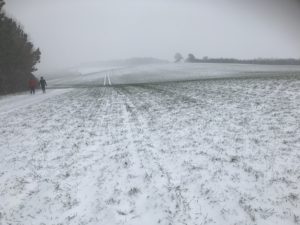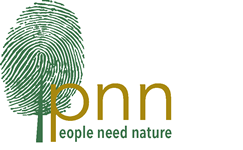
snow covered winter crops © Miles King
Last week was a momentous one in the life of farmers and anyone who take an interest in our food.
The National Farmers Union (NFU) took the historic step of appointing a woman to be its President – it’s symptomatic of these strange days, that the NFU, the most conservative of bodies, should appoint a woman leader before the Labour Party has managed it.
Minette Batters takes the helm at probably the most serious crisis point for farming in the UK since the Second World War. Others who failed to win the election may have breathed a quiet sigh of relief, for not being in charge when it is quite possible that things will go very badly wrong for farmers.
You may think none of this is relevant to you, but what happens to agriculture determines not only where our food comes from and the standards to which it is produced; but also the impact that farming has on land, water, soil and nature across three quarters of the UK land area.
Yesterday (27 February 2018) the Government’s Environment Department (Defra) published its long-awaited proposals for the future of farming in the UK. The paper is called – slightly oddly – Health and Harmony. (Oddly because it contains almost nothing about the relationship between health and agriculture – let alone music.)
The proposals for a new policy are a direct result of Brexit, which means the UK leaves the EU Common Agricultural Policy or CAP as it is known, currently swallows up around half of the entire EU budget which, in 2016, totalled a staggering 50 billion euros.
To be honest there were very few revelations to be found in the 66 pages (with lots of white space) of the new consultation document. The Government reiterated its commitment to move to a “public money for public goods” approach. Public Goods include things like nature, water quality, soil quality and tackling or adapting to climate change, as well as more intangible things like natural beauty and the mental health benefits of being in nature.
The paper gets confused between Market Failures (costs to society that are not paid for by the market) and Public Goods (things which land provides for people which cannot be used up and which are available to all.) It suggests that paying for improvements in the productivity of farmland is a public good – it really isn’t and nor is food production. Government funding should be used to support innovation in agriculture, but that’s a whole different point.
The Government, through this consultation, has repeated its desire to reduce the burden of bureaucracy on farmers – the Farm Inspection Review had already been announced the previous week. This new inquiry follows a long line of previous inquiries, which have gradually snipped away at some elements of regulation, while leaving glaring gaps elsewhere.
When it comes to bureaucracy, CAP certainly has its fair share of absurdity. Current rules require farmers to map individual shrubs and tracks, on pain of hefty fines. Losing a single ear tag from a sheep can mean loss of farm payments. Elsewhere though, farmers can plough up ancient wildflower meadows with impunity. And while some farmers may feel they are disappearing under paperwork, the Environment Agency recently highlighted the fact that pollution from agriculture was the main reason why the quality of our rivers and lakes continues to decline.
Secretary of State Michael Gove’s paper is keen to lay the loss of wildlife and history from our farmland at the door of the CAP. In truth though a great deal of the damage was done during the period from 1950 to 1973 – before we had joined the Common Market. It is true that hedgerows continued to be ripped out, wetlands drained and grasslands ploughed, using government grants, right up until the 1980s. But this was only a continuation of the agricultural revolution that had already been going on for decades. You can read more about this in my Agriculture after Brexit report “A Pebble in the Pond.”
The consultation does include some good proposals and some interesting case studies. Natural England, the Government’s wildlife expert body, is experimenting with something called “Payment by results.” This approach pays farmers to ‘produce’ more wildlife, rather than paying them to follow a set of rules created by someone else, which may or may not produce more wildlife. This encourages innovation – and also gives the farmers the freedom to adopt whichever approach they feel is right for their farm. Farmers are a notoriously independent bunch, and adopting this approach appeals to that independent nature.
Elsewhere the consultation confirms that we will continue to apply the “polluter pays” principle after leaving the EU. Polluter Pays, means exactly what it says – if you pollute, then you pay to have it cleaned up. In some ways Polluter Pays could be seen an admission of failure – better not to pollute in the first place. But the principle, if properly applied, encourages farmers to change practices so they avoid the risk of polluting, and thereby having to pay.
One of the really major issues here is whether farm regulations will be strengthened or weakened. Polluter Pays relies on regulations – the threat of fines or worse. There is a suggestion within the paper that the Government is thinking about strengthening what is known as the Regulatory Baseline. Conversely, the paper proposes that farmers become their own regulators – this is known as marking your own homework.
The risks are obvious – without independent assessment, those who ignore things like food safety, animal welfare or environmental protection can proceed without risk of being caught, while law-abiding farmers end up being tarnished by the same brush when their “free loader” neighbours finally get caught.
On Pesticides, the Government recognizes that:
“Farmers must be able to protect their crops and people must be protected from the risks that pesticides can pose to them and the environment. Strong regulation of pesticides is essential to limit the risks, but this should be supplemented by integrated pest management.”
There is clearly a tension here between a recognition that the public is rightly suspicious of industry claims about the safety of agro-chemicals, and the agro-chemical industry’s strong influence over Government policy. Adopting an integrated pest management approach is something the UK signed up to thanks to an EU Directive in 2009.
Farmers and landowners are understandably worried that the current system, in which they have been operating for over 40 years, is going to come to a crashing stop, with nothing to replace it. Their fears are that the current budget of nearly £4 billion paid out in subsidies to farmers a year is likely to be severely cut – possibly to less than £1Bn a year. And this could all happen very quickly. If the UK crashes out of the EU without a deal – the so-called hard Brexit – farm payments via the EU will stop in just over a year’s time. This leaves no time at all for a transition to the new approach of paying for public goods.
One other large disappointment for me is that the importance of protecting existing high quality wildlife habitat on farmland was almost completely ignored in this consultation. There were plenty of mentions of creating new habitat – whether by planting trees or sowing seeds, but very little recognition that there is an existing resource, and much of it is unprotected and at high risk.
Existing high quality wildlife habitats on farmlands can be protected as Sites of Special Scientific Interest. Many are not though. Natural England is supposed to legally protect them (in England), but it has fallen behind with the task of designating new SSSIs. The risk is that, with the massive changes that are coming (unless Brexit is reversed), much of what is left will be destroyed, as farmers try and extract income from every available inch of their land.
this article first appeared on People Need Nature CEO Miles King’s No Tern Unstoned column for the Lush Times website..

Comments are closed.